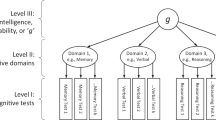Abstract
From the latter half of the 19th century to the Great Depression and the rise of fascism in the 1930s, it was fashionable both in and out of scientific circles to stress the contribution of the genetic worth of individuals and groups to their economic success. This stress was to be as often found among progressives, who used the doctrine to affirm birth control, divorce, and equal educational and economic opportunity for women, as among conservatives, who relied upon eugenic arguments to justify the natural superiority of their favoured social classes, ethic groups, and races. Eugenics, for instance, was supported by such radicals as Havelock Ellis, Beatrice and Sydney Webb and George Bernard Shaw, as well as such conservatives as Francis Galton, Leonard Darwin and Charles Davenport.
Access provided by CONRICYT-eBooks. Download reference work entry PDF
Similar content being viewed by others
From the latter half of the 19th century to the Great Depression and the rise of fascism in the 1930s, it was fashionable both in and out of scientific circles to stress the contribution of the genetic worth of individuals and groups to their economic success. This stress was to be as often found among progressives, who used the doctrine to affirm birth control, divorce, and equal educational and economic opportunity for women, as among conservatives, who relied upon eugenic arguments to justify the natural superiority of their favoured social classes, ethic groups, and races. Eugenics, for instance, was supported by such radicals as Havelock Ellis, Beatrice and Sydney Webb and George Bernard Shaw, as well as such conservatives as Francis Galton, Leonard Darwin and Charles Davenport.
Brought into disrepute by its association with Nazism, the notion of genetic destiny resurfaced in the United States in the 1960s as a conservative reaction to the civil rights movement of American blacks (Jensen 1969; Herrnstein 1971; Eysenck 1971). The ensuing flurry of invective and empirical research has generated its proverbial quota of heat, and some light. My assessment of the evidence is that it provides no support for the notion that racial differences in economic success can be attributed to their genetic inferiority with respect to mental functioning, since no acceptable technique of correcting for environmental differences between distinct racial groups has been devised. This same evidence provides some positive evidence for the effect of genes on economic performance in general, but it is so difficult to separate genetic and environmental factors, even among such relatively restricted samples as monozygotic (identical) twins, that the extent of this effect is unknown. It certainly is not enough to justify the use of the notion of genetic differences in any serious way in the formulation of economic policy.
To illustrate this point, consider one of the most careful and powerful examinations of the role of genes in explaining earnings (Taubman 1976a). Taubman uses a sample of 2468 pairs of monozygotic and dizygotic (fraternal) white male twins, attempting to explain differences in earnings at age 50 using such family background variables as parents’ earnings and occupational status. This sample should provide the best possible evidence for or against the role of common genes, since monozygotic twins share all their genes, while dizygotic twins are no more genetically similar than two brothers. Assuming no assortive mating, no sex-linked genes, and no dominant and recessive genes, Taubman finds that the combined family environment explains 54% of the variance in earnings, while other influences explain the remaining 46%. However, depending on the extent to which twins share the same family environment more than two genetically unrelated individuals, the family contribution is apportioned so that the ratio of environmental to genetic factors ranges between 8% and 75%. In a related article (Taubman 1976b) using this sample, Taubman shows that not correcting for family background leads to a severe upward bias in estimating the returns to years of education. But the extent to which this bias is due to genetic as opposed to social factors cannot be ascertained.
It has been suggested (Jensen 1969) that individuals who perform badly on standardized cognitive tests be shunted out of the public educational system on grounds of the efficient application of economic resources. Certainly cognitive performance has been a central determinant of educational attainment in most modern societies. Yet one can show using a representative sample white American males (Bowles and Gintis 1976, pp. 110–12) that the economic return to education does not fall appreciably when cognitive performance is controlled in a regression analysis of earnings and occupational status. Moreover, it can be shown that for the same sample, the observed relationship between social class background and earnings is only in small part due to the tendency of families to pass on IQ differences (Bowles and Gintis 1976, pp. 120–22) either genetically or environmentally.
It is thus safe to say that if all differences in economic achievement were eliminated except for differences in IQ, and if the differences in the latter were maintained at their present level, there would be virtually perfect intergenerational economic mobility. In this sense, arguments which justify economic inequality, either among individuals or between races, on the basis of presumed intellectual differences, must be incorrect.
See Also
Bibliography
Bowles, S., and H. Gintis. 1976. Schooling in capitalist America: Educational reform and the contradictions of economic life. New York: Basic Books.
Eysenck, H. 1971. The IQ argument. New York: Modern Library.
Herrnstein, R. 1971. IQ. Atlantic Monthly, September.
Jensen, A. 1969. How much can we boost IQ and scholastic achievement? Harvard Educational Review 39(1): 1–123.
Taubman, P. 1976a. The determinants of earnings: genetics, family, and other environments; a study of white male twins. American Economic Review 66(5): 858–870.
Taubman, P. 1976b. Earnings, education, genetics, and environment. Journal of Human Resources 11(4): 447–461.
Author information
Authors and Affiliations
Editor information
Copyright information
© 2018 Macmillan Publishers Ltd.
About this entry
Cite this entry
Gintis, H. (2018). Intelligence. In: The New Palgrave Dictionary of Economics. Palgrave Macmillan, London. https://doi.org/10.1057/978-1-349-95189-5_871
Download citation
DOI: https://doi.org/10.1057/978-1-349-95189-5_871
Published:
Publisher Name: Palgrave Macmillan, London
Print ISBN: 978-1-349-95188-8
Online ISBN: 978-1-349-95189-5
eBook Packages: Economics and FinanceReference Module Humanities and Social SciencesReference Module Business, Economics and Social Sciences




